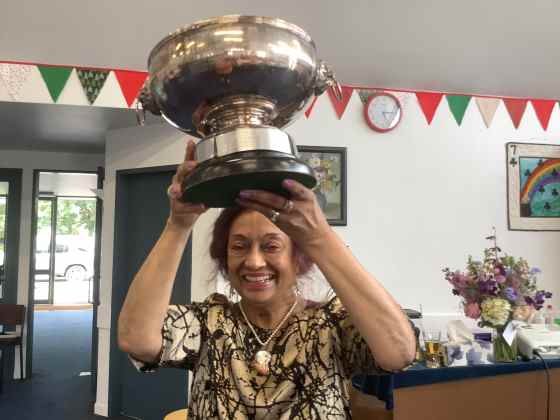Sita Monaghan - A Bridge player par excellence

Thank you, Sita, for agreeing to this interview. Sita is known by all for her gracious manners and her smiling welcome at the bridge table. She is always calm and helpful, sending happy opposition on their way, usually having taken a large plus score from them.
I am Sita Monaghan. My Bridge ranking is Open. I love the game of bridge. For me it is a lifesaver.
My bridge beginnings.
I started playing cards as a child at home; Canasta and Last Card. Every weekend we played cards with all the family. My mother loved cards and so do my brothers and sisters. After I met Michael at Otago University, we sailed to England on the Atlantis and a friend of
Michael’s taught us both the basics of bridge. We played every day for four weeks while at sea. Once we arrived in England I started work as a physiotherapist. There was another couple at the practice who also played bridge. So, in the evenings, once a week or so we would play bridge at their place.
A few years later, in 1976 we came back to New Zealand, to Nelson and the first thing I did was look up the bridge club. We both started there but because we didn’t know the etiquette of club bridge, on our first night someone at the table got quite angry and called the director when Michael touched the opponent’s card. That put him off completely and he has never played club bridge again. We played socially for years with friends of ours, the Handiside's who lived in Richmond.
I kept going to the club. I loved the game and I liked the competition. I started on Monday nights with my partner Doug Monks. We didn’t know the rules and it wasn’t until I started playing on Tuesdays that I met my mentor, Tony Hinkley. He taught me the system. He taught me Acol and after that I never looked back.
Why does bridge appeal to me?
It is always a challenge because each hand is so different. No two hands are the same.
Every time we pick up a hand of cards you never know what it is going to end up being. It is a joy to pick up 13 cards, especially when you have a partner who knows your bidding and you can talk to through your system.
Why play bridge?
Bridge is a very social game. You meet so many people and you can play bridge all over the world. I have played in many places and all I need to do when I am overseas is to ring up the bridge club and say that I’d love a game and I haven’t got transport. They will pick me up and drop me home at the end of the evening. That is a great delight. Bridge clubs are very generous.
Bridge Highlights.
A highlight for me was in 2006 when I won the Senior Interprovincial Teams at Congress with Robin Young as my partner and another pair from Christchurch. They gave out trophies then. I was still a Junior and he asked me to play. It was a privilege to play with him. Other highlights were winning the Senior Championship Pairs at Nelson a number of times and becoming a Grandmaster. To become a Grandmaster, you need at least 500 A points and 500 B points. And to get them you need to play and win in a lot of tournaments.
What am I thinking when playing bridge?
It is really important to have a process in your head. If I am declarer the first thing I think about is, what have the opponents bid? That tells me where the points are. Then I look at the lead to see if that helps me. What information can I get from the lead. Then I look at partner’s hand and I think: how many tricks do I need? how many can I get? And, if I haven’t got enough tricks, how can I make those extra tricks? I do it automatically now but you must train yourself to go through those questions. If the opponents have bid, it helps me to work out where I need to finesse and who might have the vital cards I need to find? When they don’t bid, it is much harder to place the cards. It is important to take the time to do this before playing to the first trick.
If I am the defender I always think about the bidding because that tells you where the points are and then I look at partner’s lead and I use the rule of 11. Provided my partner leads 4th highest against NT then subtracting that from eleven tells me how many cards higher than the lead are held in the other three hands. I can work out which card to play.
Bridge Tips for aspiring players.
Play bridge as often as you can. It is like any sport: the more you practice, the better you get.
Try to ask players, better than you for a game at the club.
Make sure you and your partner have a clear system which you discuss
Does playing bridge teach you anything outside the bridge rooms?
Bridge is a numbers game so having to count keeps you active. I have made many friends through bridge. The most fun is to play socially for a small amount of money. The money helped to sharpen our thinking. We would swap partners and talk about the hands and what we could have done. I was very lucky to have Tony as one of my teachers. Thank you, Tony.
..... see less
..... see more